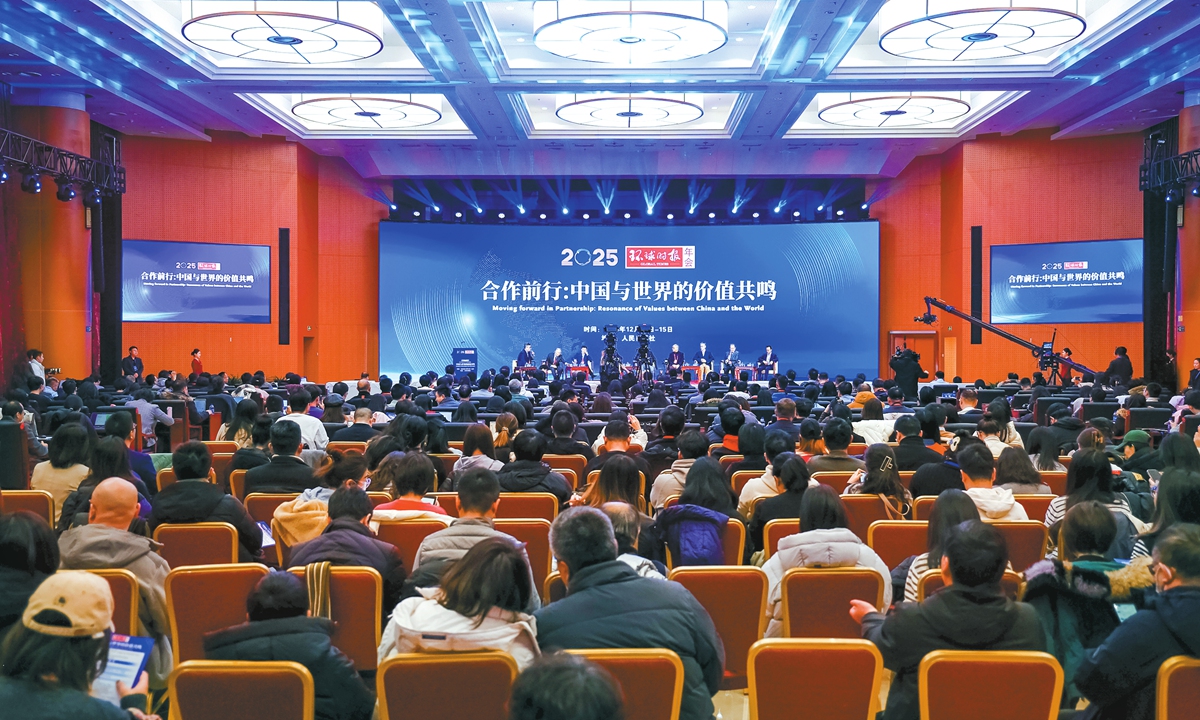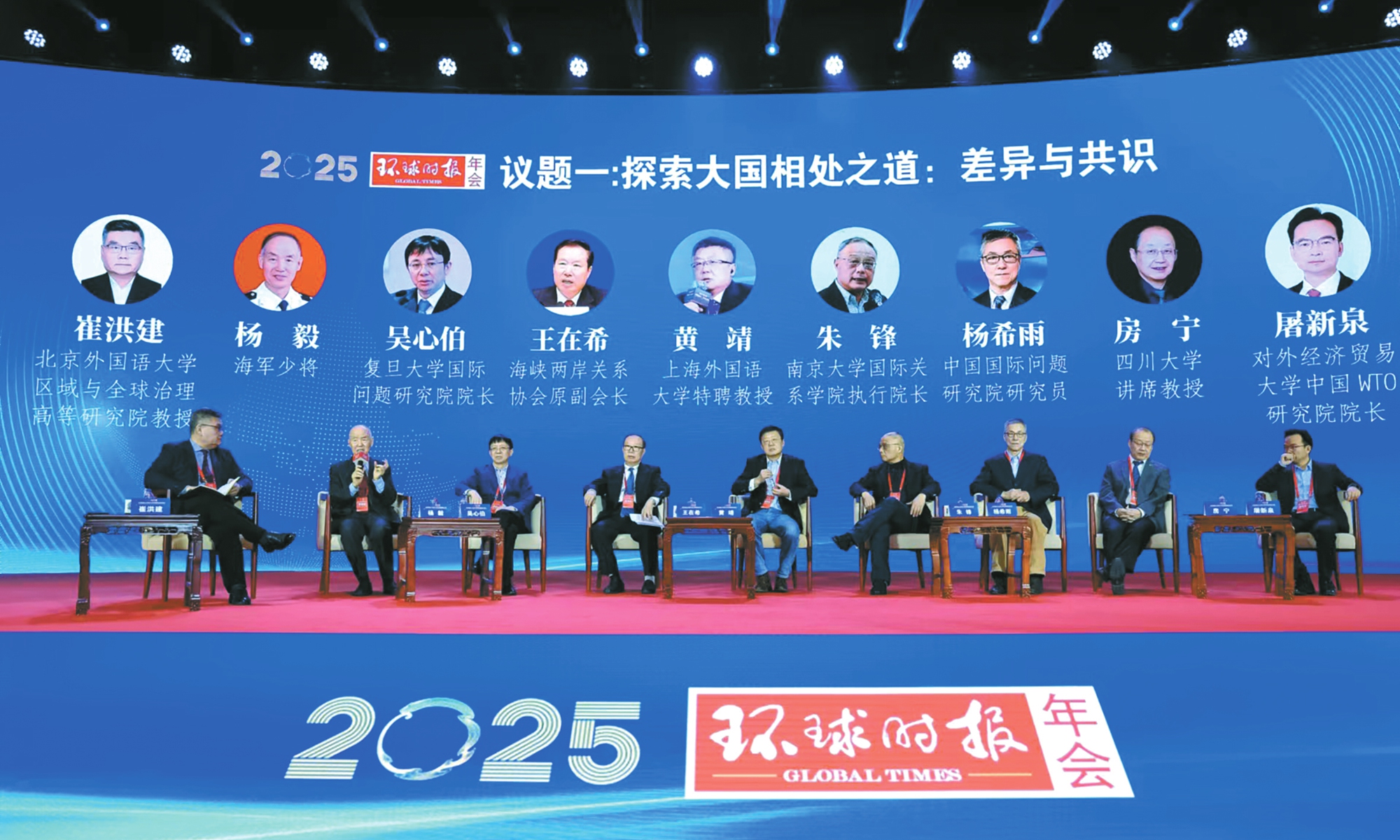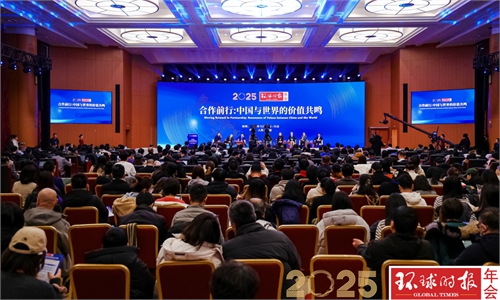
The Global Times Annual Conference 2025, themed, "Moving forward in Partnership: Resonance of Values between China and the World," takes place in Beijing on December 14, 2024. Photo: GT
Editor's Note:The Global Times Annual Conference 2025, themed, "Moving forward in Partnership: Resonance of Values between China and the World," was held in Beijing on Saturday. The Global Times invited over 100 prominent figures and experts from politics, academia, and business, both domestically and internationally, to discuss four major topics. They explored, from different perspectives, the practical paths and efforts for China and the world to move forward together and build a community with a shared future for mankind. The op-ed desk will publish relevant content for four consecutive days. Today's publication features the first session of the conference, "Exploring the path of great power relations: differences and consensus."
Three key points to watch in major power relations next year
Zhu Feng, dean of school of international studies at Nanjing University
The way of interaction among major powers has always existed; the question is under what background and international context this interaction takes place, and what values we need to promote in order to meet the demand of each nation's strategic development.
There are three characteristics of major power relations this year. First, domestic political factors have fermented to create new uncertainties in the foreign policies of major powers; second, divergences and controversies over core strategic issues are deepening; third, the US' interest-centered approach and protectionism may exacerbate to challenge the global economic and trade situation.
As the world's second-largest economy, China's understanding of the global order and its rules is evolving, especially regarding its relations with the world. The essence of major power interactions lies in understanding the changes in the relationship between China and the world, as well as identifying China's key international interests during this transformation. A rising China, influencing and reshaping the world, is not an overnight process; it requires long-term and sustained efforts.
Wu Xinbo, director of the Center for American Studies at Fudan University
There are three key points to watch in major power relations next year. First, China and the US will enter a new round of competition. While the strategic challenges are severe, there are some tactical opportunities. Second, in terms of ending the Russia-Ukraine conflict, US-Russia relations will undergo some loosening and adjustments. Third, China's relations with other major powers will face new opportunities, and the overall diplomatic environment facing China will see significant improvements.
Regarding China-US relations, the development of the relationship follows its own historical logic. At certain stages, cooperation between the two countries was more prominent, driven by the balance of power and mutual interests. Currently, China and the US have entered what the US terms a "strategic competition" phase. This is a period of US' efforts to contain and suppress China. While this phase is not what we hope for, it is, in some sense, consistent with the logic of great power relations.
Whether under a Democratic or Republican administration, the US' basic positioning toward China and the fundamental design of its China policy will not change in the short term. However, from a longer-term perspective, the strategic competition between China and the US shows periodical characteristics. In the future, the US may realize that its efforts to contain and suppress China have not been effective, and that the cost to its own interests is too high and unsustainable. In that case, the US policy toward China will likely be adjusted.
Huang Jing, a distinguished professor at Shanghai International Studies University
Among the current four major world powers - China, the US, India and Russia - China, India and Russia all belong to the Global South, and are also members of BRICS and the Shanghai Cooperation Organisation, this marks the most fundamental structural change in the international landscape since the Industrial Revolution.
In this irreversible shift in the international landscape, "a just cause attracts much support, an unjust one finds little." This "just cause" refers to peaceful and stable development, which is the shared goal of the vast majority of countries and a global trend. In international affairs and major power relations, China has made the maintenance of peace and the promotion of development its primary responsibility as a major power. As a result, China's responsibility and achievements will receive positive responses and support.
Regarding the current international order, there are three fundamental pillars. The first is the international political order centered around the United Nations. The second is the global economic and trade order framed by the World Trade Organization, the Organization for Economic Cooperation and Development, the Regional Comprehensive Economic Partnership, and the Comprehensive and Progressive Agreement for Trans-Pacific Partnership. The third is the international financial order supported by institutions like the World Bank, the International Monetary Fund, the Asian Infrastructure Investment Bank, and the Asian Development Bank. The common feature of these three pillars is their foundation in multilateral mechanisms, created collectively by all, rather than dominated by any single major power. For this reason, China firmly upholds multilateralism in international affairs, and advocates for global governance based on multilateral mechanisms.
China needs to focus its efforts on managing its own affairs
Yang Yi, Chinese People's Liberation Army Navy rear admiral
We are currently in one of the most perilous periods since the Cold War, and China plays a pivotal role in global power dynamics. Geopolitical blocs worldwide face instability, with numerous conflicts and tensions. In this context, humanity has indeed reached a crossroads. The three China-proposed initiatives highlight China's actions and vision. China-US relations are very complex, characterized by strategic structurality, irreversibility, long-term nature, and interactive effects.
China's development aims to enhance domestic well-being while contributing to the world. However, some people in the US view China as a challenger and seek to contain China. The fundamental strategy of the US does not allow the development of countries with potential. Although China advocates for cooperation based on common interests, the US' containment strategy against China remains unlikely to change. In this situation, China should focus on its own development, while preparing for the worst-case scenario, fostering healthy China-US relations and making more contributions to the world.
Yang Xiyu, senior research fellow at the China Institute of International Studies
China-US relations encompass a wide range of areas, which can be categorized into three main domains: politics and security, economic/trade and technology, and ideology. Looking ahead, the relationship is expected to face even more challenging times, with intense competition and potentially stormy and turbulent scenarios. China must be well-prepared for these developments.
The increasingly tense China-US relations stem from two key factors. First, the shifts in the balance of power between the two countries led to rising US strategic anxiety toward China. Second, the international political security order centered on the United Nations is facing mounting challenges, while the US dollar-dominated international economic and financial system is becoming increasingly unsustainable and even dysfunctional. Currently, the core structural issue in the international system is the dysfunction of the old order while a new order cannot be established. In its relations with China, the US has pursued a strategy of competition aimed at outcompeting and beating China. In contrast, China needs to follow three guiding principles: mutual respect, peaceful coexistence, and win-win cooperation. Given the significant differences between the two sides, what can be done? For China, there is only one path: to focus its efforts on managing its own affairs.
Wang Zaixi, former deputy director of Association for Relations across the Taiwan Straits
On the Taiwan question, China's policy is very clear. That is to continue to strive for peaceful reunification, while also making full preparations for the dangerous move made by "Taiwan independence" separatists.
In the past four years, the Biden administration had a characteristic in handling China-US relations: On one hand, it adopted a comprehensive tough containment strategy toward China; on the other hand, it had always maintained close contacts with the Chinese government's senior officials, including military communication. In their own words, they aimed to ensure that the bilateral relations would avoid confrontation in the process of competition. Therefore, in these four years, China-US relations were sometimes rather tense, but generally controllable. After the new US administration takes office, it is generally believed that the US side may intensify its efforts in containing China. But in my opinion, there are still areas and room for cooperation in China-US relations.
One of the core matters in China-US relations is the Taiwan question. There is uncertainty about the US side's policy on this question in the future. However, in this aspect, Beijing is more dominant. The US will have great concerns even if it plans to interfere in the Taiwan question. The Democratic Progressive Party authorities in Taiwan do want to "rely on the US to seek independence" and "seek independence through military buildup," but they are doomed to fail. After decades of development, especially in the past dozen years with the enhancement of comprehensive national strength, especially its military strength, Beijing has the capabilities and conditions to contain "Taiwan independence" separatist acts.

Participants speak at the first session "Exploring the path of great power relations: differences and consensus" of the Global Times Annual Conference 2025. Photo: GT
'Dual-core drive' of China and US more beneficial for global economy
Fang Ning, chair professor at Sichuan University
Despite the many issues we face today, it is particularly crucial whether China and the US can ultimately reach a consensus moving forward, specifically to return to a direction of stable cooperation. There is a general understanding or consensus that a country's foreign policy and international relations are greatly influenced by its domestic politics. I have studied four US presidential elections over more than a decade, and this time I've gained new insights. We often talk about fundamental issues or underlying logic. So, what is the underlying logic or fundamental issue in US domestic politics? It's essentially about elections, and about votes. Observing US foreign policy necessitates studying the distinct characteristics of US political system, particularly voter behavior and attitudes. Modern political science, shaped by US elections, also serves electoral needs. This is a fundamental issue.
The Republican Party and the Democratic Party in the US are different from each other. The main goal of the Republican Party is to revitalize American manufacturing and industry, achieve the revival of the US, and reshape its international competitiveness. The prerequisite for this is to adjust the global industrial chain, supply chain, and value chain, which is the fundamental issue at hand.
Tu Xinquan, dean of China Institute for WTO Studies at the University of International Business and Economics
Economic and trade relations can be seen as the foundation of China-US relations and serve as the ballast for their stable development. In my opinion, economic and trade relations indeed involve both competition and cooperation, which has always been the case. However, at different stages, the dominant aspect may vary.
The multilateral trade system in the past operated with the US market at its core. However, with the US market and economy facing problems, the core in the past can no longer single-handedly drive the global economy. The China-US "dual-core drive" is more beneficial for the development of the world economy. In my view, China's role in the global economy is still primarily that of a producer, and its position as a consumer has not yet been fully demonstrated.
The key issue in the global trade system lies in how to coordinate the conflicting economic interests of different producers. There are mainly two approaches: First, to create a larger international market through the inclusion of new members, technological advancements, and institutional improvements; Second, to foster a more interdependent, closely intertwined relationship among producers.
We should have a rules-based global order with same rules for every country
Erik Solheim, former under-secretary-general of the United Nations and former executive director of the UN Environment Programme
The 21st century will be multipolar, making it a much greener century, as China leads the global green transformation. It will also be a fairer century, as India and Africa will have their voices heard. But it can be a fundamentally unstable century, because there are so many problems which need to be taken into account. So how can we make stability in the 21st century?
We need a rules-based global order. The concept of "a rules-based global order" has sometimes been understood, particularly in the West, as one set of rules for the West and another set for the rest of the world. For instance, I hear they say that the sovereignty of Ukraine is sacrosanct, but you cannot care less for the sovereignty of Palestine. Similarly, they claim that interfering in the internal affairs of other nations is wrong, except when it comes to the US, which has been involved in such affairs since the 1980s, including military operations and the assassination of foreign leaders. There is also a tendency to label terrorists attacking the West as very dangerous while showing less concern for terrorists attacking other nations. Furthermore, there is a call for open global trade, but when a developing nation like China becomes too competitive in this open market, tariffs are imposed, and protectionist measures are enacted.
The answer to this Western hypocrisy is not to say we should not have a rules-based global order; it is to say we should have a rules-based global order, with the same rules for everyone. We want to defend the sovereignty of all nations. No nation shall interfere in the internal affairs of other nations. We want to work together to defeat terrorism, and we want an open global trade, which would make prosperity for everyone.
To establish this rules-based global order, we need new institutions like BRICS and the Shanghai Corporation Organisation, which play the key role as voices of the "Global South" in the 21st century. At the same time, we need to reform old institutions. The UN cannot be stuck in the paradigm of 1945, and the order of the Security Council and the UN needs to be reformed; it needs more dynamic leadership. And the UN needs to focus on outcomes for the people of the world, not on processes.
As the underpinning of this new global order, I will suggest two principles. The first is respect. The first is respect. Very recently, I went to Taizhou in Zhejiang Province, China, which is the home to the "Hehe" culture. "Hehe" means unity in diversity. In ancient China, it represented the idea of bringing together the main schools of thought—Confucianism, Taoism, and Buddhism—into a cohesive framework. In today's world, it signifies the importance of harmony between nations, even if they are different, and the necessity of working together.
A "Hehe" culture can inspire us to respect one another; it can inspire the US to respect China as a much older culture, as a much bigger nation, and as a nation which today has much more modern infrastructure and cities. Conversely, it can also encourage China to respect the US as the primary driver of technological and scientific change in the world over the last two centuries as well as a nation that has produced brilliant leaders such as George Washington or Abraham Lincoln.
The second principle is dialogue. When there are different views in solving conflicts, bringing economic growth, or creating an ecological civilization, we should have dialogue as to how we achieve that.
If we base the 21st century on the principles of respect and dialogue, and if we strive to establish a set of global rules that apply equally to all nations and individuals, then we are on the path to making the 21st century a much better and more successful time for humanity. By working together, there is no limit to what we can achieve: creating prosperity, fostering peace, and building an ecological civilization.

